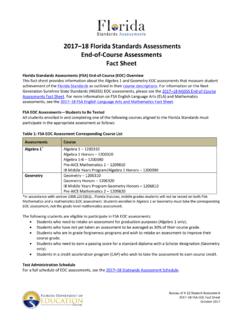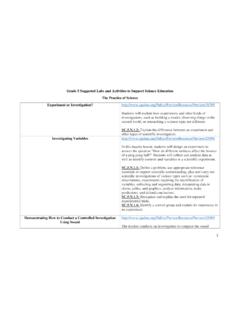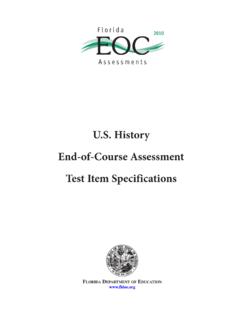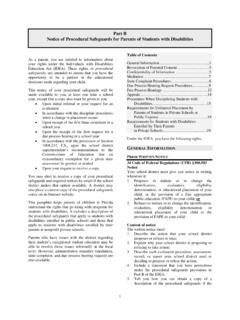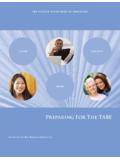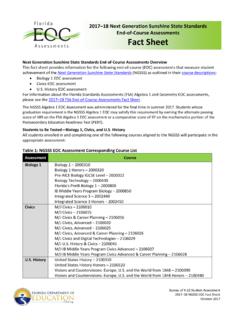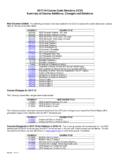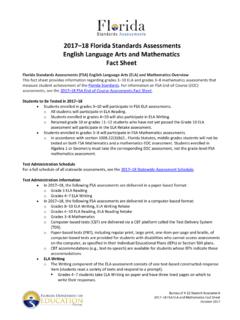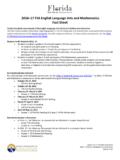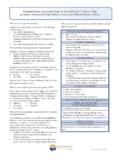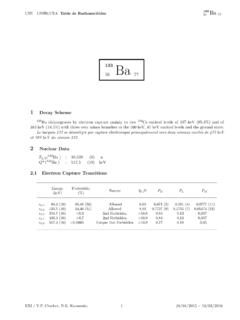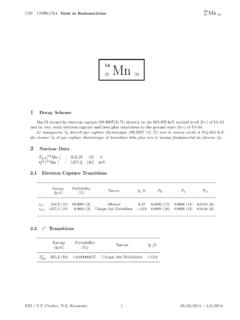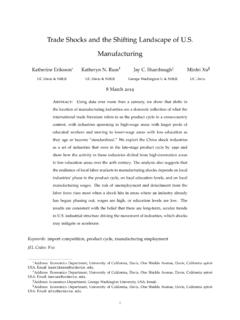Transcription of Florida's Frameworks for K-12 Gifted Learners
1 Flori da s Frameworks for K 12 Gifted Learners Providing Next Generation Sunshine State Standards, which support a challenging and rigorous curriculum, in order to meet the needs of Gifted students in our schools. Sponsored by the Florida Department of Education Working on Gifted Issues Challenge Grant Project Florida Association for the Gifted Bureau of Curriculum and Instruction Revised January 2013 Teresa D. Sweet, Bureau Chief This publication was initiated by the Working on Gifted Issues (WOGI) Challenge Grant Project through the North East Florida Educational Consortium (NEFEC) and the University of North Florida with Christine Weber, Principal Investigator, Cort McKee, Project Director, and Karen Hairston, Project Director, funded by the State of Florida, Department of Education, K-12 Public Schools, Bureau of Exceptional Education and Student Services, and the Clearinghouse Information Center.
2 Florida Department of Education Bureau of Exceptional Education and Student Services Bambi J. Lockman, Chief Evy Friend, Administrator, ESE Program Development and Services Do nnajo Smith, Program Specialist, ESE Program Development and Services Original Copyright State of Florida Department of State 2007 Authorization for reproduction is hereby granted to the State System of Public Education as defined in section (1) , Florida Statutes. No authorization is granted for distribution or reproduction outside the State System of Public Educatio n wi thout prior approval in writing. Bureau of Curriculum and Instruction Revised January 2013 Task Force Members Christine L.
3 Weber, co-chair University of North Florida Ben Graffam, co-chair University of South Florida Mary Anne Handley member Lake Highland Preparatory School, Orlando Willis Henderson member Escambia County Public Schools Martha Kesler member Orange County Public Schools Jodi O Meara member FDLRS Manatee County Public Schools Marty Orr member Retired, Marion County Public Schools Suzanne Rawlins member Volusia County Public Schools Laurel Stanley, member University of North Florida Thank you to the Florida Association for the Gifted (FLAG) for their co-sponsorship and support of this project. Thank you to the Coordinators and ESE Directors of Gifted Programs who provided feedback to the task force members at the Florida Department of Education Statewide Meeting, October 2006, in Daytona Beach. A special thank you is extended to Dr.
4 Beverly Shak lee (George Mason University, Virginia) and Dr. Cecelia Boswell (Austin Creek Education Systems, Texas) for providing editorial comments and suggestions as part of the document s external review. Dr. Shak lee is one of three editors for the National Association of Gifted Children s Aiming for Excellence: Gifted Programs Standards (2001). Dr. Boswell is one of the developers for the Texas Advanced Academics Curriculum Evaluation System (2005-2007). Bureau of Curriculum and Instruction Revised January 2013 This is Florida s Frameworks for K-12 Gifted Learners available through the Bureau of Curriculum and Instruction, Florida Department of Education, designed to assist school d istricts and state agencies, which su pport educatio n programs in the provision of special programs for exceptional stude nts.
5 For additional information on this publicatio n co ntact the Bureau of Curriculum and Instruction, K-12 Pub lic Schools, Florida Department of Education, Room 432 Turlington Building, Tallahassee, Florida 32399-0400. Telephone: (850) 245-0423 Fax: (850) 245-0826 E-mail: Bureau of Curriculum and Instruction Revised January 2013 TABLE OF CONTENTS Preface .. 1 Rationale/Mission Statement .. 2 Suggested Use of Florida s Frameworks for K 12 Gifted Learners .. 4 Standards Coding Scheme .. 6 Student Outcomes Frameworks Goals and Objectives .. 7 Interpreting the . 9 Program Goals Goal 1 .. 10 Goal 2 .. 14 Goal 3 .. 18 Goal 4 .. 23 Goal 5 .. 27 Goal 6 .. 31 Goal 7 .. 35 Additional Materials Visualizing the Goals.
6 38 Support .. 39 .. 44 Bibliography .. 46 Bureau of Curriculum and Instruction Revised January 2013 PREFACE This document, Florida s Frameworks for K-12 Gifted Learners , is the product of the Working on Gifted Issues (WOGI) grant, f unded by the State of Florida, Department of Education 2005-2007 and revised in January 2013. It provides Next Generation Sunshine State Standards for developing and designing differentiated learning experiences for Gifted stude nts. The resulting document combines the current research and practices related to educating Gifted children and the expertise of a task force consisting of Gifted educators, parents, and representatives from the Florida Department of Education.
7 The task force members discussed the work of two previous documents published by the Florida Department of Education - GAGE: Greater Accountability in Gifted Education (1994) and Blueprint: Organizing for Results (1995) - and the impact these documents had on the accountab ility of meeting stude nts needs in the state of Florida. The task force members determined the need to update those reports in the form of a curricular framework for Gifted Learners . Additional guidelines were provided by Aiming for Excellence: Gifted Program Standards published by the National Association for Gifted Children (NAGC). Bureau of Curriculum and Instruction Revised January 2013 1 RATIONALE/MISSION STATEMENT Students who are Gifted have learning needs that go beyond what is traditionally offered in the regular classroom.
8 Th e na ture of their abilities, demonstrated or latent, requires differentiated learning experiences and opportunities for them to maximize their potential. Teachers need to develop the depth and quality of their s tude nts experiences while adjusting the pace to meet individual needs. This can be accomplished by offering opportunities for stude nts to: Pursue topics of study in greater depth or to a greater level of cognitive challenge Tackle a wider range of authentic and complex academic tasks that require doing real world work Advance through activities at a faster pace Develop a sense of self and the possibilities that the world has to offer Th ese experiences may be addressed in a differentiated curriculum that may involve the modification of content, process, product, and/or the learning environment (Tomlinson, 1999).
9 In Curriculum for Gifted and Talented Students (2004), Joyce Van Tassel-Baska states: The trend for curriculum designed for the Gifted in the future must embrace paradox. It must provide stude nts with a rigorous, high-quality experience that readies them to successfully traverse the next level of educational challenge in a selecti ve university as well as ground them in self- learning and social learning of the moment. It must help them find true self in the midst of growing toward a professional career. It must inculcate a healthy sense of respect for civilizations past accomplishments as well as the desire to shape a new and better world in the future. Such a curriculum must first be envisioned, then developed, and then implemented. The real challenge for the future of curriculum in this field is the preparation of educators committed to the vision of curriculum as the core of what makes Gifted education a worthwhile enterprise (p.)
10 Xxxii). The goal of the Florida s Frameworks for K 12 Gifted Learners is to provide Next Generation Sunshine State Standards, which su pport a challenging and rigorous curriculum in order to meet the needs of Gifted stude nts i n our schools. The Bureau of Curriculum and Instruction Revised January 2013 2 following rigor and challenge of the Next Generation Sunshine State Standards interrelate and reinforce curriculum, instruction, and assessment to help define academic excellence in programs for Gifted Learners .
